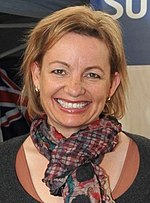Shadow cabinet of Australia
| This article is part of a series on the |
| Politics of Australia |
|---|
 |
| Constitution |
|
|
In Australian federal politics, the shadow cabinet is the opposition's equivalent to the federal cabinet. It comprises the most senior figures within the opposition, headed by the leader of the opposition as the counterpart to the prime minister of Australia.
The shadow cabinet is the highest level of the shadow ministry (or "opposition frontbench"), which also includes other less senior shadow ministers (equivalent to the government's "outer ministry") and shadow assistant ministers. The members of the shadow ministry are assigned one or more portfolios, usually though not necessarily corresponding to an existing ministerial portfolio within the government. They serve as the opposition's chief spokespeople on matters within their portfolio, and during parliamentary question time may direct questions at their government equivalent. If the opposition forms government, such as through winning a federal election, it is typical for members of the shadow ministry to retain the same portfolio.
The current shadow cabinet as of June 2022[update] is the Dutton shadow cabinet.
Role and functions
[edit]According to Bateman (2008), the shadow cabinet exists as a "recognised component of the parliamentary system" but "the functions, roles and practices of the Shadow Cabinet are far less clear than those of the Cabinet".[1]
The role of the shadow ministry in making opposition policy has varied.[2]
Meetings of shadow cabinet are less formal than actual cabinet meetings, typically lasting a shorter time.[3]
History
[edit]In May 1965, the Australian Labor Party Caucus voted to establish a formal shadow ministry of 25 members.[4] This replaced an earlier "opposition executive" consisting of 14 members.[5]
Since 1987, the shadow ministry has had at least as many members as the ministry, and sometimes more. Shadow parliamentary secretaries (known as shadow assistant ministers since 2016) were first appointed in 1990.[6]
Current arrangement
[edit]| Shadow Minister | Portfolio[7] | Image | |
|---|---|---|---|
| Peter Dutton MP (Dickson) |

| ||
| Sussan Ley MP (Farrer) |
|

| |
| Senator Jane Hume (Victoria) |
|

| |
| Senator Jacinta Nampijinpa Price (Northern Territory) |
|

| |
| Senator Susan McDonald (Queensland) |
|
||
| Ted O'Brien MP (Fairfax) |
|
||
| David Littleproud MP (Maranoa) |
|

| |
| Senator Perin Davey (New South Wales) |
|
||
| Senator Jonathon Duniam (Tasmania) |
|

| |
| Senator Simon Birmingham (South Australia) |
|

| |
| Kevin Hogan MP (Page) |
|

| |
| Senator Michaelia Cash (Western Australia) |
|

| |
| Senator Sarah Henderson (Victoria) |
|

| |
| Angus Taylor MP (Hume) |
|

| |
| Paul Fletcher MP (Bradfield) |
|

| |
| Michael Sukkar MP (Deakin) |
|

| |
| Senator James Paterson (Victoria) |
|

| |
| Dan Tehan MP (Wannon) |
|

| |
| Senator Anne Ruston (South Australia) |
|

| |
| Senator Bridget McKenzie (Victoria) |
|

| |
| David Coleman MP (Banks) |
|

| |
| Andrew Hastie MP (Canning) |
|

| |
| Barnaby Joyce MP (New England) |
|

| |
Salary and benefits
[edit]As of July 2019[update], ordinary shadow ministers were entitled to either a 20 or 25 percent loading on top of the base parliamentary salary. The loading depends on the number of shadow ministers. Officeholders within the opposition receive higher loadings, up to 87 percent for the leader of the opposition.[8] Historically, ordinary shadow ministers received no additional salary compared to backbenchers but were granted an additional staffing allowance.[9]
See also
[edit]- Shadow Ministry of Peter Dutton
- Leader of the Opposition in the Senate
- Manager of Opposition Business in the House
- Manager of Opposition Business in the Senate
References
[edit]- ^ Bateman 2008, p. 1.
- ^ Bateman 2008, p. 4.
- ^ Bateman 2008, p. 24.
- ^ Bateman 2008, p. 9.
- ^ Bateman 2008, p. 10.
- ^ "The (official) Opposition". House of Representatives Practice. Parliament of Australia. Retrieved 18 July 2020.
- ^ "Shadow Ministry - The 47th Parliament". Australian Parliament House. Parliament of Australia. Retrieved 18 June 2022.
- ^ "Salary". Department of Finance. Retrieved 18 July 2020.
- ^ Bateman 2008, p. 7.
Sources
[edit]- Bateman, Joel (2008). In the shadows: the Shadow Cabinet in Australia (PDF). Australian Parliamentary Library. ISBN 9780980655407.
